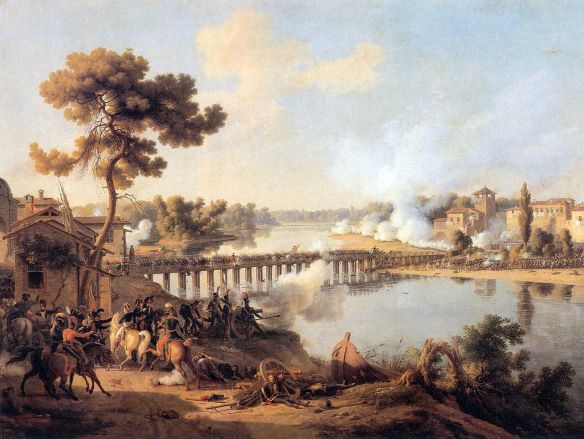
General Bonaparte gives his orders, in The Battle of Lodi, by Louis-François, Baron Lejeune
A relatively minor engagement against the Austrian rear guard defending the bridge over the Adda River in the Italian village of Lodi, this battle was nevertheless instrumental in the development of Bonaparte’s self-perception and of his public image as a great commander.
After defeating the Piedmontese in his first Italian campaign, Bonaparte turned his attention to the pursuit of the Austrians under Feldzeugmeister Johann Peter Freiherr von Beaulieu. It was necessary to cross the river Adda on a 170-yard-long wooden bridge at Lodi, in defense of which Beaulieu had left a rear guard of some 12,000 men and 14 cannon.
Bonaparte decided to storm the bridge, even though the Austrian guns completely dominated it. He sent a cavalry contingent up the river to cross and then sweep down on the Austrian right flank. He formed his grenadiers into columns in the shelter of the city walls and gave them an inspirational speech. Then, to the cries of “Vive la République,” they stormed the bridge. This attack faltered, but generals André Masséna and Louis- Alexandre Berthier soon led another attack across the bridge. In light of the heavy Austrian fusillade on the bridge, many French troops jumped off and opened fire from the shallow part of the river. A counterattack by the Austrians was foiled as French cavalry arrived just as more French infantry attacked the bridge. The cavalry sabered the enemy gun crews and routed the Austrian forces, which left behind their artillery, several hundred dead, and almost 2,000 prisoners.
Bonaparte was a whirlwind of action. Observing from close range and from a church tower, he took personal charge of every detail. He even positioned the can- non along the river, earning for himself the sobriquet “the little corporal” for doing work normally assigned to a soldier of that rank. Bonaparte’s strength lay not just in his military skills but in emotional leadership, something that had not been particularly necessary in his previous engagements. He had inspired his men to undertake the rather daunting task of running across a bridge into concentrated Austrian fire.
The Austrian retreat from Lodi opened the road to Milan and gave the French troops new confidence. Lodi was far more important than simply a battle that opened the way to Milan. Beyond its somewhat limited military significance, the battle created a change in Bonaparte’s attitude toward his future: He now knew he was a leader. In exile at St. Helena he wrote that it was at Lodi that he first saw himself as able to achieve great things.
Lodi also had an important effect on Bonaparte’s troops. It was there that they first observed him in action and finally gained complete confidence in him. It was the beginning of the special relationship between Bonaparte and his men; indeed, Lodi marked the beginning of their personal devotion to him that would last some twenty years.
References and further reading
Boycott-Brown, Martin. 2001. The Road to Rivoli: Napoleon’s First Campaign. London: Cassell. Chandler, David G. 1995. The Campaigns of Napoleon. London: Weidenfeld and Nicolson. Wilkinson, Spenser. 1930. The Rise of General Bonaparte. Oxford: Clarendon.